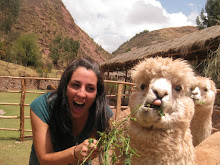So yesterday in my RSP program class we had to deliver presentations about our semester long research or volunteer work. I think my presentation went well. But what I really wanted to share are a few situations I didn't understand previously within Perú. The first one is the issue of sexual rights and marraige. The legal age to get married is 16 and to have sexual relationships, 18. If you're under 18 and pregnant, you cannot seek appropriate medical care as doctors are obligated to report the pregnancy, illegal under the age of 18. Therefore, even in a marraige situation, a pregnant wife of 17 couldn't seek proper medical treatment. As of now, there are no acceptions to the rule. There is also a lack in adecuate sex education in prevention of STDS and pregnancy(mostly due to the connection between the catholic church (GRR) and the government). Some girls in my group volunteer at an NGO designed to promote awareness and education to house maids that are underage (12-16 years old and working as house maids full time). Most of the students in the class (girls and guys) from 12-19 don't even know about their sexual reproductive parts or how prescription medicine isn't all the same. And most of the NGOs that exist for these types of reasons are underorganized or lack sufficient funds and thus not as progressive as they potentially could be. The other presentation that kind of surprised me was about the education system (or lack of a system) in rural Perú (the majority of the country). One girl travelled to different schools to teach and observe throughout Perú and I had known the illiteracy rate was terribly high before, but I'd never thought about how poor the education that is avaiable in those areas is. For example, one teacher in her encounter at a HIGH SCHOOL didn't even know the differnce between China and Japan as 2 seperate countries and that there was a difference in the language. The teacher had asked the girl about her uncertainty because she said she didn't have access to a map. NO access to a map means limited or no access to internet or educative books. Many of the school children in these areas only speak their native tongue, Quechua, when the only small library collections that exist in those areas are in Spanish. The government does not acknowledge or work to progress these education situations because Perú is very centralized in Lima. As I was listening to these 2 presentations in particular it made me realized how Lima is worlds apart from the rets of the country and how blessed I am to have my easily available and reliable american education and rights. There are also many NGOs and commercials that I see promoted human rights awareness, because many of the people here are unaware of what rights exist for them and thus their rights are being abused and they're not doing anything about it.
Not that the university education here is bad, my classes are academically good. But one thing that surprised me most was the university libraries. This may have just been my experience, but most of the books are older (30s-80s I'd say) and information doesn't seem to be very updated in libraries with the exception of professor recommended articles. But every books I've had to find in the library has been very old and I haven't noticed much update. Very different in comparison to the Temple (american) University system where nearly anything is available at your fingertips. I also haven't searched as much here nor have I gone to other libraries beyond the university, but I was definitely a little surprised by the library at PUCP. This is something I think could be an advantageous investment on part of the university.
The first part about the presentations really struck me. There are so many norms in my life as an American that some people in this country would never dream of. For example, today I was studying in the kitchen with our empleada (house maid) who lives and works in the house. We spend a lot of time together because we are both kind of like additions to the family and we're both home during the day and we are a year apart, to the date. Anyways, today she told me about how she hadn't seen her mom in 6 years since she's been working in Lima. She left her home and family in Iquitos (rainforest city) to come to Lima when she was 15... I couldn't imagine leaving my mom when I was 15 and still not having seen her to date! They still maintain contact, but with the economic and social situations in this country and metropolitan concentration in Lima, she's been here for all of that time. It's still hard to understand some things in this country that are "normal".
The other night my grandma came into my room right before I left to go running and told me what sexy legs I have and how I should keep up with running to maintain my youth when I am older lololol and tonight, like many nights, she came to knock on my door to give me a manderine. She is soooo darn adorable! I love her :)
The rest of the week will be working on some papers and research, sleeping in, studying, squeezing in runs, an IFSA student-family goodbye dinner and a meeting to talk about re-entry into the United States, which is supposedly a lot more difficult to do than coming into Perú.. that should be interesting to see.
Hope you learned a lot!
Tuesday, November 30, 2010
Subscribe to:
Post Comments (Atom)

No comments:
Post a Comment